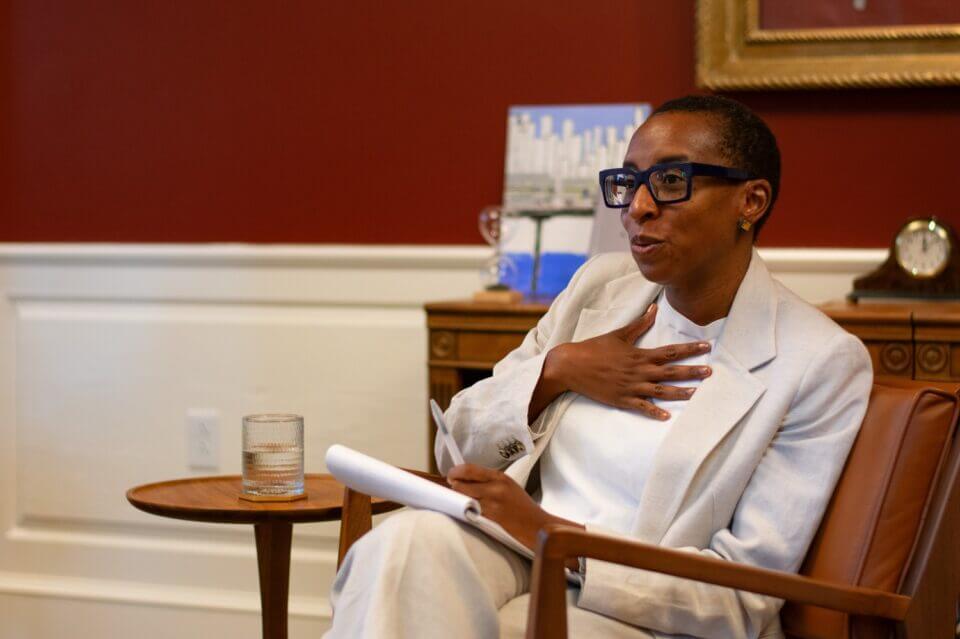
“As my co-author Kai Whiting and I argue in an upcoming book…free speech debates have become not simply a matter of whether or to what extent certain ideas should be banished from the public domain, but why, how, and for whom they should be restricted.”
Not long after the terrorist group Hamas savagely killed and kidnapped Israeli citizens on October 7, 2023, a fiery kerfuffle emerged on social media after 30 or so student groups at Harvard University claimed to “hold the Israeli regime entirely responsible for all unfolding violence” in Gaza and that any reaction by Israel in defense of its nation would amount to “colonial retaliation.”
Several renowned public figures were quick to denounce the student group statements. The economist and former President of Harvard University Lawrence Summers tweeted: “…Harvard is being defined by the morally unconscionable statement apparently coming from two dozen student groups blaming all the violence on Israel. I am sickened. I cannot fathom the Administration’s failure to disassociate the University and condemn this statement.” Another Harvard economist, Jason Furman, tweeted that the sentiments expressed by the Harvard student groups “are egregious. Blaming the victims for the slaughter of hundreds of civilians. Absolving the perpetrators of any agency. This is morally ignorant and painful for other members of the community.” X was awash in similar commentary.
Meanwhile, Harvard’s leadership came under fire for an apparently slow and insufficient initial response to the Hamas attacks, as well as for not explicitly condemning the statement by the student groups. Summers lamented “[t]he silence from Harvard’s leadership, so far, coupled with a vocal and widely reported student groups’ statement blaming Israel solely,” which “has allowed Harvard to appear at best neutral towards acts of terror against the Jewish state of Israel.”
After the Hamas attacks, there was much to digest in the visceral commentary and debate that erupted in Elon Musk’s “digital town square.” However, the imbroglio at Harvard put a spotlight on one of the most prominent themes in contemporary political and cultural discourse—namely, debates about the nature and limits of free speech. On October 12th, five days after the attack, Harvard president Claudine Gay implicitly addressed the ongoing controversy by emphasizing that Harvard “embraces a commitment to free expression,” without seeking repercussions for students who signed the statement or even making explicit reference to the student groups.
Voices on the Right began making a mockery of Harvard’s alleged hypocrisy. Author Michael Shellenberger tweeted that “Harvard University faculty are world leaders in demanding greater online censorship in the name of ‘fighting disinformation.’ But now, Harvard’s president is spreading disinformation about the university’s own record on free speech.” Shellenberger reposted a tweet informing readers that Harvard “received the lowest possible score on FIRE’s 100-point scale on free speech.” Many pointed directly to the high-profile cases of Roland Fryer and Ronald Sullivan as examples of prominent black professors who were cancelled by Harvard for not abiding by left-wing orthodoxy.
Harvard’s hypocrisy was a microcosm of wider hypocrisy on the political Left, with many seeing Harvard’s equivocation as just one more example of social justice advocates who are quick to cancel professors for alleged sleights called microaggressions but have no such propensity to denounce mass murder by a terrorist group that purports to stand in the name of “decolonization.” As tweeted by evolutionary biologist Colin Wright (himself a victim of cancellation campaigns aimed at his well-informed and well-argued defense of the proposition that there are only two sexes): “What does it tell you when the same people who break into hysterics at ‘microaggressions’ are able to shrug at scenes of horrific violence in the name of ‘decolonization’? That their hysterics aren’t genuine, but merely a way to parasitize others’ empathy to achieve power.”
Complaints on the Right were not without merit. In the last ten years, a wave of activism in the name of “social justice” has repeatedly shed its skin in revealing the extent to which it is willing to stifle debate in the pursuit of its ideals. The evidence is too extensive to be delineated in this essay, but one need only examine the experiences of professors and public intellectuals such as Nicholas A. Christakis, Ilya Shapiro, and Colin Wright to get a glimpse of the wrath that can be launched at heterodox thinkers.
The controversies about social justice activism in the last ten years revolve not around whether “social justice” is a worthy goal but, rather, about what constitutes social justice and how to go about it. At the center of this storm, along with disputes about topics like race and gender, is a struggle to define the contours of freedom of speech. As my co-author Kai Whiting and I argue in an upcoming book The Virtue of Dialogue: A Stoic Defense of Free Speech, free speech debates have become not simply a matter of whether or to what extent certain ideas should be banished from the public domain, but why, how, and for whom they should be restricted. In other words, debates about free speech in the last ten years reflect developments in the philosophy of language that arose in the 20th century.
From the seemingly harmless insistence that we use someone’s preferred pronouns, to Robin DiAngelo’s Orwellian dystopia of Foucauldian discourse analysis, there is deep-seeded belief among progressives that language constructs our social reality in ways that institutionalize the will to power of privileged social groups. One of the central manifestations of this will to power is the way we come to understand our relationships in terms of hierarchical binaries such as white and black, male and female, cis and trans. The fervor of cancellation campaigns can be traced back, to a not insignificant extent, to an originally academic enterprise of deconstructing the linguistic operation of speech and text to see how discourse centers some social groups at the expense of marginalizing other groups. Hence, for example, the obsession with “decentering” Whiteness.
We trace these developments in more detail in our book. We do not necessarily dismiss them out of hand. We do, however, express a variety of concerns about how an exclusive focus on the discursive construction of social reality has too often morphed into social justice campaigns that operate with a stridency of intolerance that undermines the virtue of productive and nuanced dialogue.
We do not absolve the political Right of blame. Partisans on the Left and Right both show a proclivity to fan the flames of division rather than smooth the way for constructive dialogue. However, if we focus on the political Left, we observe a deep skepticism about the limits of reason and a deep cynicism about the virtue of a free exchange of ideas. Since ideas are presumed not to be able to escape prevailing discourses of power, it is all too often believed that social justice activism is incompatible with cool, calm dialogue. Social justice is a struggle, not a debate. Days of rage bring truth to power. Dialogue succumbs to the semiotics of the status quo.
We disagree. In defending the virtue of dialogue, we draw on two fundamental precepts of ancient Stoic philosophy. One, human beings have been endowed by nature with reason, defined as the power to discern among the impressions of our experience to determine what impressions we should assent to, and what impressions we should reject. Reason is a fundamental power that humans possess to make judgments about the world around them, and about what they should do given the impressions of their experience. Virtue requires that we do just that.
Two, virtue is the standard by which we determine whether an action is right or wrong. Given our faculty of reason, we have the capacity to cultivate virtue in pursuit of what the Stoics called eudaimonia, variously translated as well-being, happiness, or a flourishing life. What is virtue? It is the excellence of one’s character when thoughts and actions are in harmony with nature—i.e., when one’s thoughts and actions stem from proper reasoning and advance the well-being of the human community.
There are four cardinal virtues. Wisdom is the ability to identify the right thing to do in a particular set of circumstances. Courage is the drive to do the right thing for the right reasons (i.e., not to be a foolhardy daredevil). Self-control avoids excesses in one’s thoughts and actions. Justice refers to fair treatment of other people out of respect for the inherent dignity of their personhood.
In what Stoics call the unity of virtue, the four virtues work in tandem with each other. It takes wisdom to determine when to act courageously, and when to avoid taking unnecessary risks. It takes self-control to avoid taking unnecessary risks—e.g., relenting to peer pressure to undertake a crazy stunt. Justice is served when wisdom discerns the right course of action, courage galvanizes us to act, and self-control keeps us focused on the prize instead of the distracting mirage of glory.
As with all other aspects of life, our stance on free speech reveals something about our commitment to virtue. It reveals our character and whether we are trying to improve it. As creatures with reason, we have the capacity to make wise judgments about the truth of ideas that are expressed, for example, by a controversial speaker on campus. We are able to confront false ideas with steady fortitude. We can do so with the temperance of one who is confident that his judgments are in accord with justice. In short, virtue is to act in accord with our natural gifts.
In contrast, when we attempt to shut down debates as part of a cancellation campaign, we reveal defects in our character. Days of rage provide no indication that we have undertaken a serious effort to understand why we oppose certain ideas, or why our opposition to the ideas of a controversial campus speaker serves the cause of justice. We show weakness rather than courage because we substitute easy emotions for the cool rationality we would otherwise exhibit if we carefully and scrupulously went about exposing defects in the ideas of a controversial campus speaker. We lack self-control in failing to temper our emotions in recognition of the foolhardiness of anger, which serves no other purpose than to distract us from pursuing the path of virtue.
The statement by Harvard President Claudine Gay supports our case. Claiming that “we have a choice” between fanning “the flames of division and hatred” and being “a force for something different and better,” President Gay affirmed the university’s rejection of terrorism such as “the barbaric atrocities committed by Hamas,” as well as the hatred of Jews, Muslims, and “any group of people based on their faith, their national origin, or any aspect of their identity.” She affirmed the university’s “commitment to free expression,” which “even includes the views that many of us objectionable, even outrageous.” The university, she went on, does not “punish or sanction people for expressing such views.” None of this means that the university endorses such views. The point is that “it is in the exercise of our freedom to speak that we reveal our characters.”
We could not agree more. In that spirit, it is our contention that the character of the Israeli government and defense forces will depend mightily in the coming weeks, and perhaps months or years, on how they conduct themselves as they confront Hamas, seek justice for the slain, attempt to rescue hostages, and plan the future defense of their nation. It will take wisdom and courage for the Israeli Defense Forces to figure out how effectively to defeat Hamas without sacrificing the lives and well-being of Palestinian innocents. They must exhibit self-control in avoiding revenge as a motive for their actions. The cause of justice is served not by vindictive retaliation but by rescuing hostages, seeking justice for the victims of the attack by Hamas, and the elimination of a band of terrorists and their supporters who seek to destroy the nation of Israel.
We hope Claudine Gay, and partisans of the Left in general, would agree. But, if not, we invite them to explain why as part of our own commitment to free speech. Virtue is not a function of rage or partisanship. It is instead a function of whether we act in accord with nature by conducting ourselves as creatures of reason, who can determine how to exercise wisdom, courage, temperance, and justice. The debates about free speech should not fall prey to cancellation campaigns but, rather, should encourage the virtue of dialogue. Claudine Gay’s public statement would seem to agree. We only hope that she, and Harvard’s leadership, remain consistent in their “commitment to free expression,” even when they believe the ideas being expressed are outrageous.
Virtue demands it.
Jonathan Church is a government economist and author. He is author of Reinventing Racism: Why “White Fragility” Is the Wrong Way to Think about Racial Inequality, as well as Virtue in an Age of Identity Politics: A Stoic Approach to Social Justice. He can be found on X @jondavidchurch











